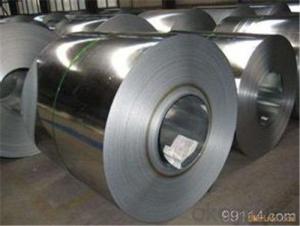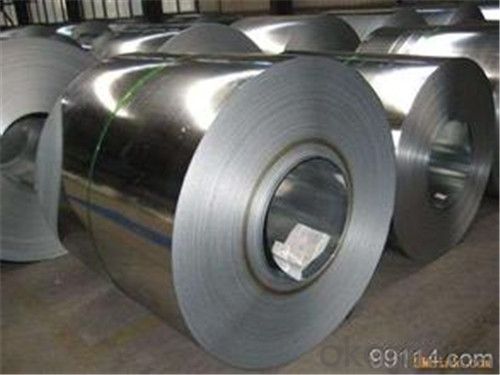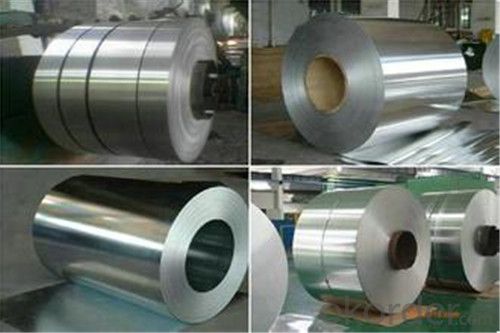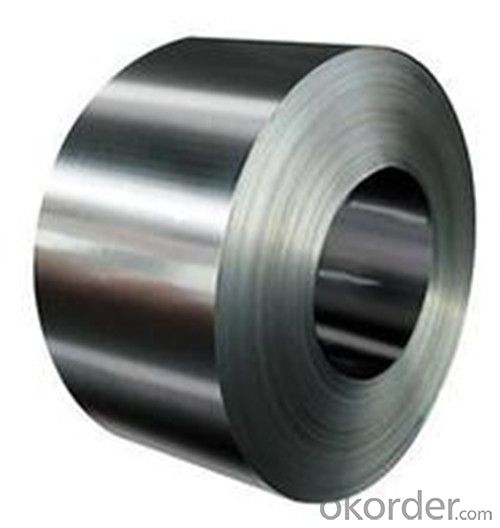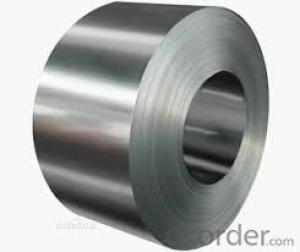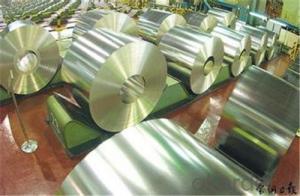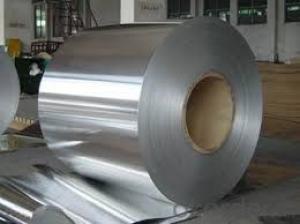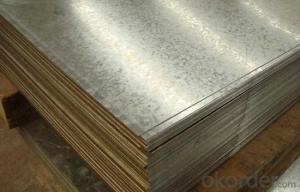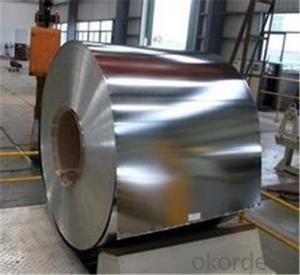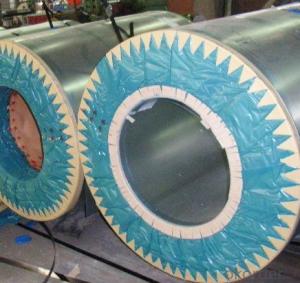Cold rolled Steel Coil/Plates with high Quality from CNBM
- Loading Port:
- Tianjin
- Payment Terms:
- TT OR LC
- Min Order Qty:
- 100 m.t.
- Supply Capability:
- 89000000 m.t./month
OKorder Service Pledge
OKorder Financial Service
You Might Also Like
Description of cold rolled steel coil :
The raw material of cold rolled steel coil/sheet is high quality hot rolled product, and after pickling, kinds of new technology and new process of global cold rolling production have been applied. Therefore the manufacturing, home appliance, automobile etc.
Specification of cold rolled steel coil :
standard | AISI, ASTM, DIN, GB, JIS |
Steel Grade | Q195/Q195L/st12/dc01/spcc |
Thickness | 0.15-1.5mm |
Width | 500-914mm |
Length | coil |
Place of Origin | Shandong,china(mainland) |
Producing ablity | 500,000 Tons/month |
Type of payment | T/T, L/C |
Packing | As per customer's requirement |
Delivery | 30days after contract |
Price | FOB&CIF |
MOQ | 20Tons |
Packaging & delivery of cold rolled steel coil :
Packaging Detail: | Oil coated, metal shell and anti-rust paper with corner protected by sheet or coil |
Delivery Detail: | 30 days after receiving deposit or L/C |
Characteristic cold rolled steel coil :
1. Refrigerators, cabinets, power distribution baords and drums.
2. Automobile floor and roof panels.
3. Automobile fenders and quarter panels
4. Automobile fenders and quarter panels
Images of cold rolled steel cold rolled steel coil:
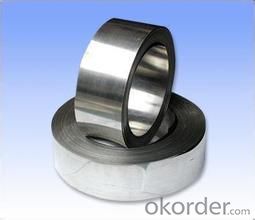
FAQ
1.What's your MOQ?
25MT, it is for one container.
2.Do you have QC teams?
Yeah, sure, our QC team is very important, they will keep the quality control for our products.
3. What's your normal delivery time?
Our delivery time about 10-20days for standard sizes, if you have other requirements like hardness and width ,it is about 20-40days. But don't worry ,we also try our best for the
- Q: How are steel coils inspected for coil set?
- Various methods and equipment are utilized to inspect steel coils for coil set. Coil set refers to the curvature or shape of the coil, which can affect its performance and usability in different applications. One way to inspect steel coils for coil set is through visual examination. Experienced operators or inspectors carefully assess the coils for any visible deformities or irregularities in their shape. This can be accomplished by unrolling a section of the coil and checking for signs of buckling, twisting, or unevenness. Visual inspection is a simple and cost-effective method to identify evident coil set issues. In addition to visual examination, more advanced techniques are employed to accurately measure and quantify coil set. One such technique involves using a straight edge or template. The straight edge is placed along the length or width of the unrolled portion of the coil, and any gaps or deviations from the straight edge indicate the presence of coil set. This method provides a more precise measurement of the extent and severity of the coil set. Another commonly used technique is the utilization of specialized tools like a non-contact laser measurement system. This system projects a line onto the surface of the coil using lasers and measures the distance between the line and the coil. Any variations in this distance indicate the presence of coil set. This method offers high accuracy and provides detailed data on the coil's shape and curvature. Other methods may involve the use of mechanical devices such as rollers or tensioners to unroll and measure the coil's shape. These devices exert controlled pressure on the coil to straighten it out, and any resistance or deviations encountered during the process serve as indications of coil set. Overall, the inspection of steel coils for coil set involves a combination of visual examination and precise measurement techniques. These methods aid in identifying and quantifying any deformities or irregularities in the coil's shape, enabling manufacturers and customers to make informed decisions about the usability and quality of the steel coils.
- Q: Do any tour players use steel shafted woods? And are there any real advantages to having steel shafted woods? I have only played with one person to use steel shafted woods, he tells me thats because he cant hit it straight with graphite, however he is a very short hitter.
- I'd be very surprised if there are any tour players still using steel shafts on their woods (I did actually see Tiger with a steel shaft on a driver during a clinic in 2002). Top end graphite shafts have gotten so much better there's just no reason for pros not to use them anymore. That being said, I use a 45 True Temper stiff steel shaft in my driver (Cobra X-speed, 9.5*). Graphite is longer than steel, but the distance I've lost is minimal (maybe 10 yards and I still put it out there 250+ consistently). The extra weight has actually helped me stay in control which has improved my overall driving considerably, and the very low torque in a steel shaft has paid off huge in accuracy. You're paying minimum $60 (or more) for a graphite shaft with a similar torque rating to any steel shaft. I hit easily twice as many fairways since the switch. I've even switched out my other fairway woods too, the feel and control are so much nicer. I've considered going with a 46 on the driver to try to regain some of the distance, and at $7 per shaft I can actually just go do that whenever I want. Don't get me wrong, if I were playing for money or flirting with par I'd invest in good quality graphite stuff no question, but it doesn't make sense to me right now. I'd recommend to anyone looking for more consistency out of their woods to take $20 to your golf shop and try it out. It's a lot cheaper than the alternatives.
- Q: What's the best material for color coated steel coil?
- Galvanized steel sheet with hot-dip galvanized or zinc plated surface.
- Q: How are steel coils used in the production of agricultural equipment?
- Steel coils are used in the production of agricultural equipment as they serve as the primary material for manufacturing various components such as frames, brackets, and structural supports. These coils are shaped, cut, and welded to create the required parts, which are then assembled to form agricultural machinery like tractors, plows, and harvesters. The strength and durability of steel make it an ideal choice for withstanding the demanding conditions and heavy workloads typically associated with agricultural equipment.
- Q: What are the main steel coil producing countries?
- The main steel coil producing countries are China, Japan, India, the United States, and Russia.
- Q: How are steel coils used in the production of metal storage systems?
- Steel coils are used in the production of metal storage systems as the primary raw material. These coils are processed and shaped into the desired forms, such as sheets, panels, or beams, which are then assembled to create sturdy and durable storage systems capable of safely storing various items.
- Q: for instance Cr-Ni steeldoes this refer to plated steel or a uniform mixture
- stainless steel is an alloy normally iron with additions of C, Mn, Ni, Cr, and Nb - amounts added depend on properties required. Corrosion resistance is due to a very thin but dense layer of chromium oxide which forms at the surface and prevents further attack. Ordinary steel on the other hand becomes coated with a porous layer of iron oxide(rust) through which the atmosphere can pass and cause further corrosion.
- Q: Steel Strings on your guitar or nylons? Why?
- There is no OR about it. You CANNOT use steel strings on a nylon string guitar because the increased tension will actually warp the top of the guitar and eventually pull the bridge right off! (I have seen it happen several times!) Although it is possible to put nylon strings on a steel string guitar it is not recommended. Nylon strings do not have as much tension as a steel string guitar is designed for. Steel string guitar necks are actually designed with a bit of back bow to compensate for the high tension of steel strings. Nylon strings have a much lower tension which could cause the neck of a steel string to settle slightly, which could actually cause the strings to fret out. It is not common, but it does happen. So keep your guitars happy and only string them with the proper strings.
- Q: What are the different types of steel coil surface treatments for durability?
- There are several different types of steel coil surface treatments that can enhance the durability of the material. 1. Hot-dip galvanizing: This process involves immersing the steel coil in a bath of molten zinc, creating a protective zinc coating on the surface. Hot-dip galvanizing provides excellent corrosion resistance and can extend the lifespan of the steel coil. 2. Electro-galvanizing: In this method, a thin layer of zinc is electrodeposited onto the surface of the steel coil. Electro-galvanizing offers good corrosion resistance and is commonly used for indoor applications or where a thinner coating is desired. 3. Powder coating: Powder coating involves applying a dry powder paint to the surface of the steel coil and then curing it under heat. This creates a durable, uniform, and attractive finish that is resistant to chipping, scratching, and fading. 4. Organic coatings: Organic coatings, such as acrylics, polyesters, or fluoropolymers, are often applied to steel coils to provide protection against corrosion, UV rays, and other environmental factors. These coatings can enhance the durability and aesthetics of the steel coil. 5. Chromate conversion coating: This treatment involves applying a thin layer of chromate onto the surface of the steel coil. Chromate conversion coatings provide corrosion resistance and can improve the adhesion of subsequent paint or powder coating layers. Each of these surface treatments offers unique benefits in terms of corrosion resistance, durability, and appearance. The choice of treatment depends on the specific application requirements and the level of protection needed for the steel coil.
- Q: Are steel coils used in shipbuilding?
- Yes, steel coils are commonly used in shipbuilding. They are primarily used to manufacture various structural components and hull sections of ships due to their strength, durability, and resistance to corrosion.
Send your message to us
Cold rolled Steel Coil/Plates with high Quality from CNBM
- Loading Port:
- Tianjin
- Payment Terms:
- TT OR LC
- Min Order Qty:
- 100 m.t.
- Supply Capability:
- 89000000 m.t./month
OKorder Service Pledge
OKorder Financial Service
Similar products
Hot products
Hot Searches
Related keywords
